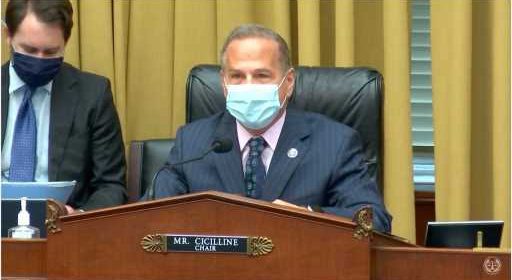Lawmakers Debate A Proposed Solution To Power Of Facebook And Google: Antitrust Immunity For News Media

This week a bipartisan group of lawmakers proposed a solution to the dominance of Google and Facebook: Give the news media a whole lot more heft.
Their bill, the Journalism Competition and Preservation Act, would allow print, online and broadcast outlets to band together to negotiate content deals with online distributors. The aim is to boost local media in particular, with widespread newspaper closures and layoffs and a decline in once reliable sources of ad revenue.
At a House Judiciary antirust subcommittee hearing on Friday, the case was certainly made that the situation for local media is dire: As the subcommittee chairman and chief sponsor of the bill, Rep. David Cicilline (D-RI) pointed out, one in five newspapers closed in the past 15 years, and the number of journalists working for print outlets has been cut in half. At least 200 counties have no local newspapers at all, he said.
Cicilline didn’t say it, but it’s not hard to imagine what it’s like to try to get informed of what’s going on in your local neighborhood or community via social media: It’s a platform called Nextdoor, which mixes reliable information with rumor, suspicion and NIMBY outrage.
But the question that seemed to hang over Friday’s hearing is whether the answer to the big power of the platforms, a notion that no one of either party challenged, would be to give an antitrust exemption to the news media. The legislation would do that for a period of four years, with certain conditions. One is that the negotiations would have to be “nondiscriminatory as to similarly situated news content creators.” In other words, two media companies couldn’t strike a deal with Google for the purpose of acing out a third.
Emily Barr, president and CEO of Graham Media Group, which owns seven local TV stations, said that what’s happened is that “certain platforms commoditize news content with little regard for the quality and the veracity of the story. This puts fact-based reporting like ours on par with unsubstantiated click-bait as we fight for user eyeballs in both platform news feeds and traditional search. The result is a dangerous focus on catchy headlines and viral stories over quality journalism.”
Another witness, Microsoft President Brad Smith, said that the company was endorsing the legislation, telling the committee, “Let’s hope that if a century from now people are not using laptops or iPhones or anything we have today, journalism itself is still alive and well, because our democracy depends on it.” He also said that he was open to ideas that they dealt with when Australia passed a new law that forces tech platforms to bargain in good faith for news content.
But there was skepticism from other witnesses, namely journalist Glenn Greenwald, who suggested that the focus shouldn’t just be on big tech but the problems with big media. He pointed to the restrictions that Twitter and Facebook placed on the New York Post in October, when they published an expose on Hunter Biden, and Twitter’s decision to ban Donald Trump from the platform. He said that in many cases it was journalists who were “pressuring these tech companies to censor and to silence ideologies with which they disagree or competitors to these organizations.
“I’m particularly worried that we have a news media that is itself increasingly concentrated, where The New York Times is essentially becoming like the Amazon of journalism.”
He said that if the subcommittee “starts taking a piecemeal approach to appease and aggrandize the most powerful industries like journalists, it could forestall the opportunity to get at the root of the problem that is concerning people across the ideological spectrum, which is the need to apply the antitrust laws to these growing monopolies not on a case by case basis, but overall.”
Even Rep. Ken Buck (R-CO), the top Republican on the subcommittee who also is sponsoring the legislation, said that he “recognized the concern that at some point there will be this smoky room and a few of the tech giants and a few of the news giants will get together and say, ‘Hey, we can make even more money if we just decide to screw all these other people, the smaller tech companies and the smaller news organizations. And to the idea that these two giants are going to collude and create something with the exemption that we are talking about in this bill may be real.”
Cicilline, however, stressed that the legislation was a four-year, temporary exemption for the news media, and that was but one solution among many they are pursuing to counter the power of the big tech companies, outlined last October in a report following an antitrust investigation.
“Anything these large media companies would negotiate would be available to the smallest rural newspaper in any town in America,” Cicilline said.
Others suggested that the leverage is lopsided in favor of tech companies even when they negotiate with larger media players.
David Chavern, president and CEO of the News Media Alliance, a trade association for news publishers, said, “The whole industry itself, from the largest to the smallest, are in a subservient relationship to two companies that have been allowed to grow and dominate those spaces with a completely hands off approach from the government for too long.”
He said that his association also wants the legislation to be expanded with an “oversight mechanism” to make sure that negotiations are done in good faith and result in equal treatment for local and community publishers. The News Media Alliance also would like to see any compensation model “reward” publishers for investments they make in journalism.
“All we are really asking for is a fair chance to fight for ourselves and our futures,” he said.
Read More About:
Source: Read Full Article
